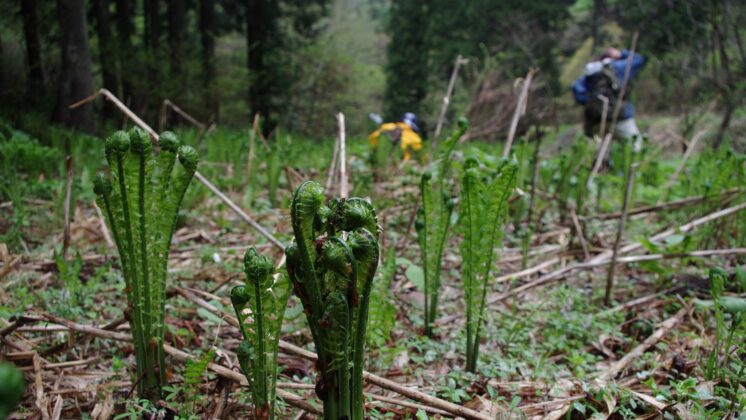Over the last century, more and more people have been leaving the countryside for the big city. Behind them, entrepreneurship in rural areas has dwindled, populations have aged, generations of farmers have struggled, and urban areas have become painfully overcrowded.
But really, what can be done to reverse such a trend? The appeal of the city is so apparent… What do smaller cities and towns have to offer?
Takuya Furubayashi, founder and CEO of Iromusubi Co., Ltd. and director of the Tsukisara Partners Center nonprofit, received his MBA from GLOBIS University in 2018. Shortly after graduation, he quit his Tokyo IT job of ten years, packed up his family, and moved to rural Niigata to start a business.
GLOBIS Insights interviewed him about this unusual career choice and how it’s gone for him so far.

How did you end up leaving Tokyo to become an entrepreneur?
I started Iromusubi Co., Ltd., a venture company, in April 2018 in Murakami City, Niigata Prefecture. Before that, I’d been an IT project manager in Tokyo for ten years.
As a company employee, I found it harder and harder to set goals for myself. I wasn’t in a position of power, so I didn’t have much control over where my big company was headed. There was more and more push to do the “must” parts of my job and less and less control over my “wants.” Additionally, my wife and I had just started a family. We both worked, but it’s so hard to save when you’re facing high rent, childcare costs, and all that in the city.
I was only about 30 years old, and I realized I wanted the rest of my thirties to be spent working toward a happier time in my forties—somewhere I had more control over my destiny, and where I wasn’t packed in among so many other people. So after I got my MBA, we decided it was time to leave Tokyo, and I became an entrepreneur.
What were your initial goals for Iromusubi?
I had two main objectives for this company: first, to revitalize the rural economy and make it more sustainable; and second, to improve the lives of people in urban areas who have lost a sense of the seasons in their hectic daily lives.
For both of these, I wanted to introduce hidden gems of Japan. This includes tangible assets such as wild edible plants, fresh farmed vegetables, nature, and local people, but also intangible assets such as local life, history, and culture. Sharing these simple pleasures with city dwellers is our way to help alleviate their stress.
We sell our products (wild vegetables and processed foods made from them) in stores and markets in the city, as well as online. We also sell wholesale to professional chefs in Tokyo. Our staff is mostly women in their sixties and seventies, and we also source from local farmers. This has the added benefit of providing new jobs and business opportunities to the region.
But Iromusubi isn’t just about selling food. We want to share local experiences, as well, so we started Iromusubi Guest House in Niigata. Guests can try harvesting wild vegetables themselves!

What’s the competition like?
Since our objective is to revitalize the local economy, we don’t really have competitors, especially in the local context. Entrepreneurship in rural areas is about everyone. We don’t compete with locals—we collaborate.
What is your customer communication strategy?
Since the earthquake in 2011, people in Japan have come to develop more family-type relationships with non-family members. We started our company and brand by reaching customers through business channels, but it turns out customers want to build that same close relationship with the providers of services and products. So now we aim to project these values through social media, etc.
Unfortunately, due to COVID-19, we had to temporarily close our guest house in April and May. As a result, our monthly revenue is about 50% of last year’s. However, we managed to survive the situation thanks to government support and a refocus on our e-commerce with urban customers in Tokyo.
The coronavirus impact will probably continue for several years, but despite the many challenges ahead, we see some positives. People are going to start viewing rural Japan not as a dying area in need of revitalization, but as open areas where they can move about freely. We also expect customers to embrace service brands as that trend of developing family-type relationships strengthens. Small-to-midsize companies like Iromusubi have the flexibility to provide this type of service.

What are the greatest lessons you’ve learned throughout your entrepreneurial journey?
During my two-year MBA at GLOBIS, I spent a lot of time and effort questioning myself: Who am I? What is my value? How do I contribute to society? The answers helped me reach my personal mission of revitalizing rural Japan through business.
Now, just two years later, so much has changed in my life. I’m in a new living situation, I’m a business owner, and the scope of my work has moved from global to local.
Not everything has been perfect. I go to bed at midnight and get up at 3am. I’ve had personal conflicts with staff now and again. The memory of harsh city life is fading because rural life isn’t as idyllic as I’d imagined. But I also have more time with my family. I get to enjoy the seasons. I’m surrounded by abundant food and nature. Most of all, I feel like we are making an impact toward both of Iromusubi’s key objectives, and that makes me feel like a success.
The greatest lesson I’ve learned is to try and find ways to be happy with other people—including balancing time for myself. I try to live with no regrets or excuses for taking charge of my life. I think that’s an important lesson for any entrepreneur.



